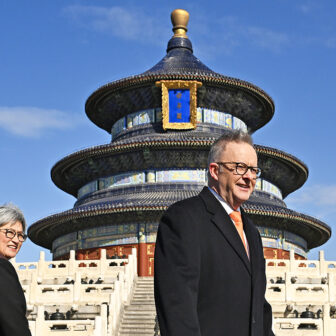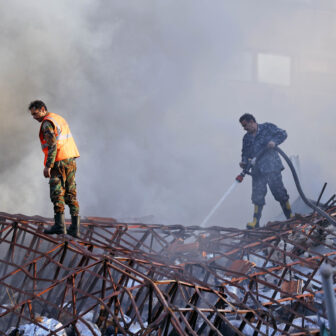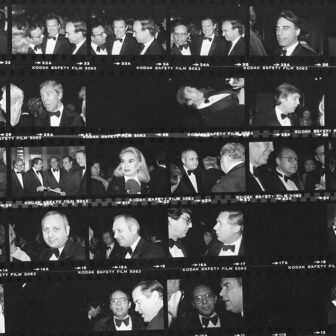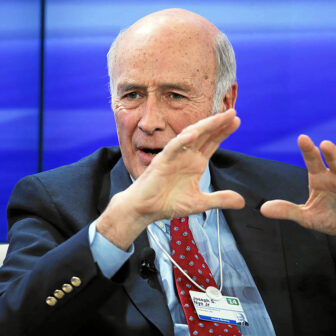Now that the dust has settled after the US–North Korea summit in Hanoi, has its significance become clearer? For an encounter that ended so ignominiously, it had a surprisingly calm denouement: the United States and South Korea expressed a desire to continue talking. Perhaps in a bid to keep the tensions on the Korean Peninsula relatively low, the two countries also formally ended large-scale joint exercises. Although North Korea, clearly hurt by the lack of agreement in Hanoi, took issue with American claims and stated (unsurprisingly) that its position on denuclearisation was immovable, it has not otherwise made any post-summit moves.
Speaking to journalists in Hanoi, president Donald Trump claimed that North Korea had asked for all sanctions to be lifted in exchange for the dismantling of Yongbyon nuclear facility. North Korea’s foreign minister Ri Yong Ho disputed the accuracy of that claim but, interestingly, didn’t launch the customary invective-laden rant.
Ri’s claim that North Korea only asked for a “partial” lifting of sanctions is difficult to parse, since it is unclear which sanctions he was talking about. The United Nations has a variety of sanctions on North Korea, but the European Union, the United States, Australia, Japan and other countries also have their own, which are more difficult to lift. Some of the American sanctions, for instance, are required by US law — in response to human rights violations and financial improprieties, for example — and have little to do with nuclear weapons. North Korean denuclearisation, even if complete, verifiable and irreversible, would not get rid of those sanctions.
One US State Department official claimed that North Korea had asked for sanctions to be lifted on “metals, raw materials, transportation, seafood, coal exports, refined petroleum imports, raw petroleum imports” but not weapons. If this is what Ri Yong Ho meant by “partial” then he was technically correct, but it has to be recognised that Trump was substantively correct.
A North Korea free of non-weapons sanctions would not feel any real pressure to give ground. The sanctions on weapons imports and exports have no significant effect on the broader economy, and nor do they affect the domestic business elites upon whom Kim Jong-un appears to rely for his political support. The trade bans on seafood, transportation and petroleum, among others, clearly do. It is these elites that Kim Jong-un must keep relatively happy to maintain stability within North Korea.
North Korea could always ramp up its provocations again in response to the failure of the Hanoi summit. It could continue to test nuclear weapons and missiles, and it could stage attacks across the Demilitarised Zone or the Northern Limit Line. But it is unclear how it would benefit from such actions. Its testing at the end of the Obama administration and the beginning of the Trump administration had a purpose: it wanted to complete its weapons program as quickly as possible, and the intensifying sanctions after every test or provocation were the necessary price to be paid. At the end of that process, with a working nuclear weapon and delivery system, North Korea was in a much better position to negotiate and deter. It can now propose a halt in testing at little cost to itself, and has more to negotiate away to remove sanctions.
But the supposed completion of its nuclear program also puts North Korea in a bind. By its own account, any further testing would have decreasing benefits in terms of capability, and now that the program is complete the regime still has to figure out a way to get rid of, or at least circumvent, substantially harsher sanctions than those that existed at the beginning of the testing frenzy. What’s more, countries will no longer nervously give North Korea aid because they are afraid of its unpredictable behaviour, so further provocations would not even benefit North Korea economically.
At the same time, the costs of further provocations are high. China would probably resume shutdowns or slowdowns at the border, crackdowns on smuggling, expulsion of North Korean businesses, and strong encouragement to Chinese firms to disengage from North Korea. All these measures were designed to be temporary, but with the ratchet of every new round of sanctions, more Chinese firms departed North Korea and didn’t return, and new sectors were removed from legal trade. Even if smugglers subsequently bypass sanctions enforcement, it is hard to believe they can compensate entirely for the loss of legal trade. And, indeed, legal trade has plummeted since the latest round of sanctions kicked in.
North Korean provocations would also mean that its rapprochement with South Korea ends or is at least delayed. Many of the projects proposed by South Korea — projects that would benefit the North — can only happen with the lifting of some of the sanctions (for example, the ban on joint ventures), or with sanctions waivers, and these will not happen without UN approval. A return to provocations would not only discredit South Korea’s president, Moon Jae-in, and put domestic political limits on what he could give North Korea; it would also mean that Moon’s successor in 2022 is unlikely to be as accepting of North Korean overtures.
Theoretically, North Korea can keep its weapons indefinitely in the event of no deal with the United States. But time is not necessarily on its side. While it is true that Kim Jong-un has received international recognition and praise from the US president, international legitimacy doesn’t feed hungry people or ambitious business figures. Because of its supposedly complete nuclear program, North Korea is in a good position to negotiate, but it does need to negotiate.
Eventually, unless North Korea finds a way to conduct most of its trade via ship-to-ship transfer and, perhaps more importantly, finds a steady stream of companies willing to violate sanctions, Kim Jong-un will need to find a way for his supporters to make money. It is not clear that there is enough profit in the smuggling business, even with the central role it plays in the North Korean economy, to keep the interlocking business and political networks that undergird Kim Jong-un’s power satisfied. •




